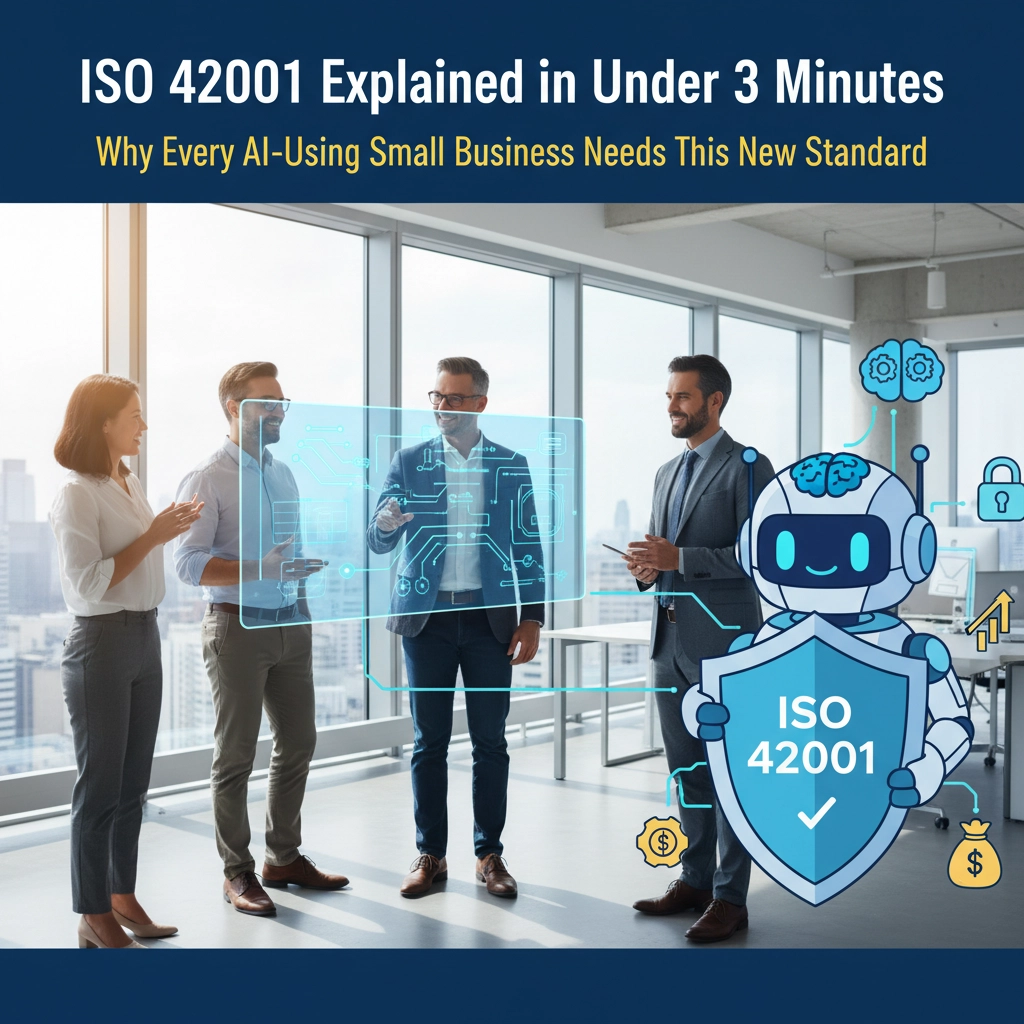
Why Embedding ISO Practices From Day 1 Beats Last-Minute Audit Prep Every Time
0
0
0
Picture this: It's three weeks before your ISO audit, and panic is setting in. Your team is scrambling to document processes that should have been established months ago, employees are stressed about sudden procedural changes, and you're wondering if you'll actually pass on the first attempt. Sound familiar?
If you've found yourself in this situation: or want to avoid it entirely: you're in the right place. The truth is, successful ISO certification isn't about cramming for an exam. It's about building a foundation of excellence that becomes second nature to your business. Let's explore why embedding ISO practices from day one transforms your entire approach to quality management.
The Last-Minute Scramble: Why It Never Works
When businesses wait until audit deadlines loom, they inevitably fall into the "tick-box" mentality. You know the one: frantically creating documents that look good on paper but don't reflect reality, training staff on procedures they'll forget within weeks, and implementing systems that feel foreign to your actual workflow.
This rushed approach creates several critical problems. First, your team becomes overwhelmed trying to learn new processes under pressure, leading to mistakes and resistance to change. Second, the disconnect between documented procedures and daily reality becomes glaringly obvious to auditors who are trained to spot these inconsistencies. Most importantly, you miss out on the genuine business benefits that proper ISO implementation can deliver.
The statistics speak for themselves: organizations that start their ISO certification process early have significantly higher first-time pass rates and experience far less operational disruption during the audit process. More crucially, they begin reaping the operational benefits immediately rather than waiting until compliance deadlines force their hand.
The Day-One Advantage: Building Excellence Into Your DNA

When you embed ISO practices from the very beginning, something magical happens: quality becomes part of your company's DNA rather than an external requirement. Your team doesn't see ISO as additional work; they see it as the foundation of how your business operates.
Cultural Integration Over Compliance
Starting early allows you to weave ISO principles into your hiring practices, training programs, and daily operations. New employees learn your quality-focused approach as standard procedure, not as an add-on to their "real" jobs. This creates a workforce that naturally thinks in terms of continuous improvement, risk management, and customer satisfaction.
Genuine Process Improvement
Rather than retrofitting your existing chaos with documentation, early implementation lets you design processes from scratch with ISO principles in mind. This means you can eliminate inefficiencies before they become habits, create workflows that actually make sense, and build systems that grow with your business rather than constraining it.
Stress-Free Audit Preparation
When audit time arrives, organizations with embedded practices approach it with confidence rather than dread. Internal audits become routine check-ins rather than panic-inducing exercises. Your team knows the processes inside and out because they've been living them, not cramming them.
Practical Steps to Embed ISO Excellence From Day One
Start With Leadership Commitment
Your journey begins at the top. Leadership must genuinely commit to ISO principles, not just certification. This means allocating proper resources, setting clear expectations, and modeling the behaviors you want to see throughout the organization.
Design Processes, Don't Document Chaos
Before you write a single procedure, map out how work should flow through your organization. Consider customer needs, regulatory requirements, and efficiency opportunities. Build ISO requirements into this design phase rather than trying to overlay them afterward.
Train for Understanding, Not Compliance
Focus your training efforts on helping employees understand why ISO practices matter, not just what they need to do. When people understand the reasoning behind procedures, they're more likely to follow them consistently and suggest improvements.
Make Internal Auditing Routine
Don't wait for external audits to evaluate your systems. Build regular internal reviews into your calendar from the beginning. These shouldn't feel like interrogations: they should feel like team discussions about how to do things better.

The Real Business Benefits You'll See
Organizations that embrace early ISO implementation consistently report remarkable improvements across multiple areas. Employee performance and productivity increase as teams work within clear, efficient processes that eliminate confusion and rework. Customer satisfaction improves because quality becomes consistent rather than hit-or-miss.
From a financial perspective, the benefits compound quickly. Multiple industry sources provide evidence that embedding ISO practices from the outset can reduce waste by 5% or more:
Institute of Supply Chain Management (2024): Embedding ISO practices from the start can deliver at least a 5% decrease in waste due to better process optimisation and early identification of inefficiencies (https://www.ioscm.com/blog/key-strategies-for-minimising-waste-in-manufacturing-processes/).
Peer-reviewed study on ISO 14001 (Babakri, 2011): Organizations implementing ISO 14001 early experienced waste reductions, with data supporting at least a 5% drop in waste production (ScienceDirect: https://www.sciencedirect.com/science/article/abs/pii/S0959652611000084).
Intellect (2025): Streamlining processes via ISO integration at the earliest stages typically provides a waste reduction of 5% or greater (https://intellect.com/blog/saving-time-and-money-with-iso-9001/).
These findings span ISO 9001 and ISO 14001 and demonstrate a clear link between early ISO adoption and waste reduction. Efficiency gains from streamlined workflows free up resources for growth initiatives. Risk mitigation prevents costly mistakes and regulatory issues that could derail your progress.
Perhaps most importantly, early ISO implementation positions you competitively. Many contracts, particularly in the public sector, require ISO certification. Having this credential from day one opens doors that remain closed to competitors still scrambling to achieve compliance.
Beyond Compliance: Creating Sustainable Growth
The organizations that benefit most from ISO aren't the ones focused on passing audits: they're the ones focused on building better businesses. When you embed ISO practices from the beginning, you create a culture of continuous improvement that drives innovation and growth long after your certificate arrives.
This approach transforms your relationship with quality management entirely. Instead of seeing audits as hurdles to overcome, you see them as valuable feedback opportunities. Instead of viewing documentation as bureaucratic burden, you see it as a tool for scaling your success.
Your team develops problem-solving skills and quality awareness that benefit every aspect of your operation. Customer complaints become improvement opportunities. Process variations become learning experiences. Regulatory changes become manageable updates to established systems rather than crisis-inducing overhauls.
Taking Action: Your Path Forward
Ready to transform your approach to ISO certification? The journey begins with a single decision: commit to building excellence into your foundation rather than bolting it on later.
Start by assessing your current state honestly. Where are the gaps between what you do and what you document? What processes exist only in people's heads? Which workflows cause regular frustration or errors? These insights become your roadmap for improvement.
Next, engage your team in the vision. Help them understand that ISO implementation isn't about adding work: it's about working smarter. When people see how better processes make their jobs easier and more satisfying, resistance transforms into enthusiasm.
Remember, you don't have to navigate this journey alone. Expert guidance can help you avoid common pitfalls and accelerate your progress. The investment in proper preparation pays dividends in reduced stress, improved outcomes, and faster realization of business benefits.
The choice is yours: continue the cycle of last-minute scrambling and missed opportunities, or build the foundation for sustainable excellence from day one. Your future self: and your audit results: will thank you for choosing wisely.
If you're ready to embed ISO excellence into your business from the ground up, consider exploring professional guidance that can help you build the right foundation from the start. Your business deserves better than last-minute compliance; it deserves sustainable success.





